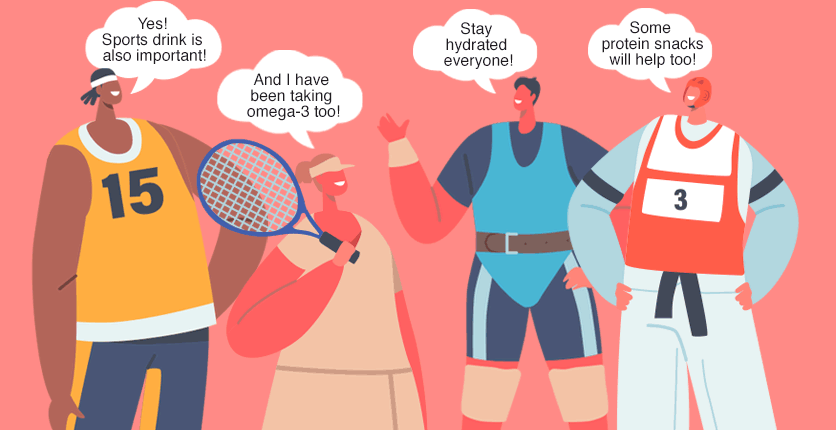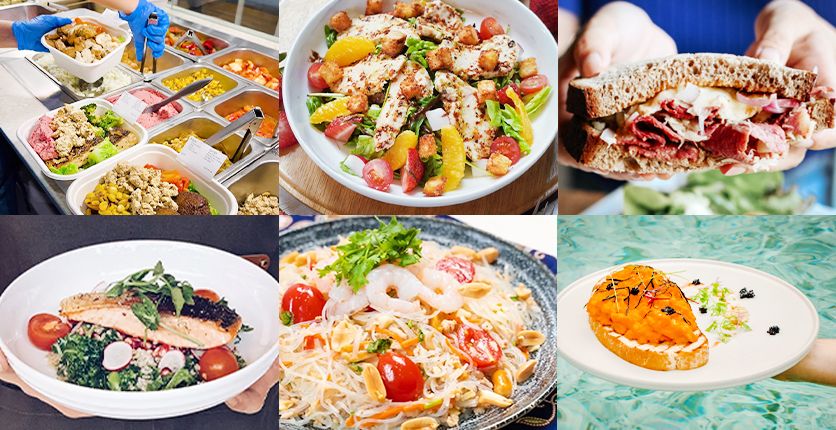Whether you are a competitive athlete or just enjoy being physically active, what you eat plays a crucial role when it comes to meeting your energy demands and improving your mental and physical performance.
The right foods are also important for recovery. Constant training may lead to muscle soreness, dehydration and fatigue, but when you’re properly fuelled, you’ll recover more quickly.
“In addition to performing better and recovering faster, good nutrition also promotes better health, allowing your body to function more holistically,” says James Yeo, Sports Nutritionist and the owner of Sports Nutritionist James. “It reduces your risk of health issues, especially if your overall lifestyle is healthy.”
Conversely, when your diet is poor or nutritionally inadequate, you may feel sluggish while training and find it harder to achieve your fitness and training goals. You’re also more likely to experience muscle soreness and thus take longer to recover. This, coupled with poor stretching and mobility habits can affect your performance, and over time your range of motion may be limited and you may experience tightness. If your training load increases, James says that these problems may potentially lead to injuries, delaying your training or even stopping you from training altogether.
Here, James shares his top nutrition tips and advice to maximise your sporting performance.
1. Choose your carbohydrates wisely

Carbohydrates are important for energy, but did you know that not all carbs are the same?
Eating a lot of simple, high-glycaemic carbs like white bread, white rice, potatoes and packaged breakfast cereals increases your glycaemic load. The sugars in these foods are absorbed faster into your body and thus provide a quick burst of energy, however they also cause your blood sugar to spike and crash within a short period, leaving you feeling lethargic and unable to focus.
“On the other hand, complex carbs like brown rice and sweet potatoes have a lower glycaemic index, so you’ll need to consume more of these foods before you experience a sugar spike and crash,” James explains.
“If your sport requires you to expend energy in short bursts – like basketball or badminton, for instance – then simple carbs might be a better option. If you’re going to be training at a steady and moderate level over a long period – think cycling or long-distance running – then complex carbs are your best choice.”
Check out our tips on healthy eating.
2. Stay hydrated

Drinking water directly improves your hydration levels, but this isn’t the only way to stay hydrated. Coconut water is also a good option as it contains electrolytes and some carbohydrates. Bananas and cauliflower are rich in potassium, a mineral that plays a direct role in your body’s hydration system. And any food containing salt helps your body retain water, but James warns to consume such foods in moderation: “If you take in too much salt, your body may respond with thirst, or even cause you to lose water.”
3. Eat foods that help reduce inflammation

Oily fish like salmon, sardines and mackerel are rich in omega-3 fatty acids, which have an anti-inflammatory effect.
“Inflammation is how the body takes care of an injury and thus shouldn’t be directly minimised, but you can certainly help your body deal with the injury better, and this is where omega-3 fatty acids come in,” James says.
Other good choices to help with inflammation and improve recovery: walnuts, turmeric, berries, citrus fruits, green leafy vegetables and broccoli.
Get your ocean-fresh fish and seafood delivered to you for your meal prep from ACE Fish Market – SAFRA members enjoy 10% purchases of regular items. More info at www.safra.sg/promotions/ace-fish-market-Year-long
Find out what causes inflammation and how else you can prevent it.
4. Choose the right sports drink

If you’re looking to improve your exercise performance, any beverage containing carbohydrates would work. If you’re going to be working out for 60 minutes or more, go with a drink containing electrolytes (usually sodium and potassium). This helps combat dehydration, delay fatigue and boost your glycogen stores.
Some drinks containing caffeine may be helpful as a pre-workout drink. These also contain carbohydrates for improved focus and energy.
But not everyone needs sports or energy drinks. James says that water is sometimes the best option, especially if you’re watching your calorie intake.
5. Snack smart

James says that fruit makes for a nutritious and convenient snack. A small pack of biscuits, a protein shake or a protein bar are all excellent picks if you want something other than fruit. Whatever you choose, he suggests something that’s 100 calories or under per serve if you want a healthy option, or something containing 200 calories and 20g of protein.
Shop for protein powders and other supplements at GNC, or try vegan organic protein powder from LyteProtein – SAFRA members enjoy up to 15% off. More info at www.safra.sg/promotions/gnc and www.safra.sg/promotions/LyteProtein
Note: Please consult your GP or physician before starting on a new diet plan.
Want more articles like this, and other lifestyle content right in your inbox? Sign up for the eNSman Newsletter – you don’t need to be a SAFRA member to subscribe – and never miss another story!










